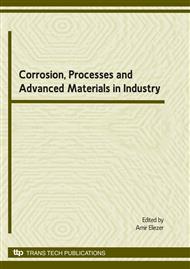p.9
p.17
p.23
p.29
p.33
p.39
p.43
p.47
p.51
Effect of H2S on Corrosion in Polluted Waters
Abstract:
There is a deep universal concern today about the influence of pollutants on the environment including soil, air and in particular water, and about their effects on the durability of engineering materials and the deterioration of structures and the infrastructure. Water pollutants affect the terrestrial, atmospheric and aquatic environments, and even when present at very low levels of a few ppm may impair human health, aquatic life and water quality. The avoidance of water pollution is, therefore, an important part of water resource management. The present work provides an overview of the effects of hydrogen sulfide (H2S) on corrosion in polluted waters, including sea, river, brackish, geothermal and sewage waters.
Info:
Periodical:
Pages:
33-36
DOI:
Citation:
Online since:
January 2010
Keywords:
Price:
Сopyright:
© 2010 Trans Tech Publications Ltd. All Rights Reserved
Share:
Citation:


